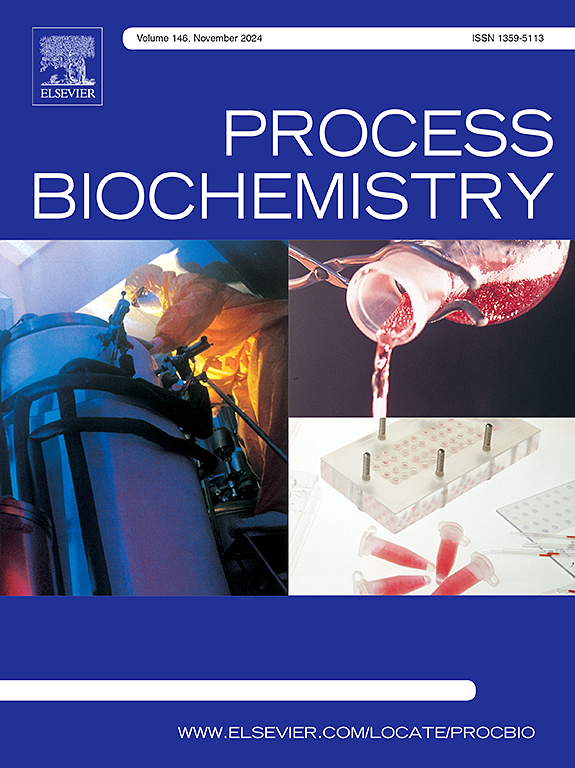Identification and characterization of novel D-lyxose isomerases from the goat rumen metagenome
IF 3.7
3区 生物学
Q2 BIOCHEMISTRY & MOLECULAR BIOLOGY
引用次数: 0
Abstract
Biocatalytic technology has emerged as a powerful tool for synthesizing functional sugars with a wide range of physiological functions. D-lyxose isomerase is an important aldose–ketose isomerase used for synthesizing functional sugars such as L-ribose and D-mannose; however, at present, only a few D-lyxose isomerases have been studied. In this study, a metagenomic approach was employed to mine novel D-lyxose isomerases from the goat rumen microbiome. Eleven full-length D-lyxose isomerase genes were identified using sequence alignment and phylogenetic analysis. All 11 genes were classified as Group Ⅱ D-lyxose isomerases and display low similarity to previously characterized D-lyxose isomerases. Five of the genes were selected for heterologous expression in Escherichia coli, and all were expressed successfully and had detectable enzyme activity. Further characterization revealed that optimum temperatures for the five enzymes range from 45 °C to 60 °C, and the optimum pH range is 7.0–8.0, with high relative residual activities under weakly acidic conditions. The recombinant enzymes have a broad substrate spectrum and are active against L-ribose, L-ribulose, D-fructose, and D-mannose, in addition to exhibiting the highest activity against D-lyxose. Among the five enzymes, GR-LI2 displays the highest activity toward L-ribulose, and GR-LI5 displays the highest activity against fructose, suggesting that these two enzymes have significant potential for L-ribose and D-mannose synthesis, respectively.
山羊瘤胃宏基因组中新型d -葡萄糖异构酶的鉴定与表征
生物催化技术已成为合成具有广泛生理功能的功能糖的有力工具。d -葡萄糖异构酶是一种重要的醛糖-酮糖异构酶,用于合成l -核糖和d -甘露糖等功能糖;然而,目前对d -葡萄糖异构酶的研究较少。在这项研究中,采用宏基因组方法从山羊瘤胃微生物组中挖掘新的d -葡萄糖异构酶。通过序列比对和系统发育分析,鉴定出11个d -葡萄糖异构酶全长基因。所有11个基因被归类为Ⅱd -葡萄糖异构酶组,与先前表征的d -葡萄糖异构酶具有较低的相似性。选择5个基因在大肠杆菌中进行外源表达,均成功表达,且酶活性可检测。进一步的表征表明,5种酶的最适温度为45℃~ 60℃,最适pH为7.0 ~ 8.0,在弱酸性条件下具有较高的相对残留活性。重组酶具有广泛的底物谱,对l -核糖、l -核酮糖、d -果糖和d -甘露糖具有活性,对d -葡萄糖具有最高的活性。在这五种酶中,GR-LI2对l -核酮糖的活性最高,GR-LI5对果糖的活性最高,这表明这两种酶分别在l -核糖和d -甘露糖的合成中具有显著的潜力。
本文章由计算机程序翻译,如有差异,请以英文原文为准。
求助全文
约1分钟内获得全文
求助全文
来源期刊

Process Biochemistry
生物-工程:化工
CiteScore
8.30
自引率
4.50%
发文量
374
审稿时长
53 days
期刊介绍:
Process Biochemistry is an application-orientated research journal devoted to reporting advances with originality and novelty, in the science and technology of the processes involving bioactive molecules and living organisms. These processes concern the production of useful metabolites or materials, or the removal of toxic compounds using tools and methods of current biology and engineering. Its main areas of interest include novel bioprocesses and enabling technologies (such as nanobiotechnology, tissue engineering, directed evolution, metabolic engineering, systems biology, and synthetic biology) applicable in food (nutraceutical), healthcare (medical, pharmaceutical, cosmetic), energy (biofuels), environmental, and biorefinery industries and their underlying biological and engineering principles.
 求助内容:
求助内容: 应助结果提醒方式:
应助结果提醒方式:


